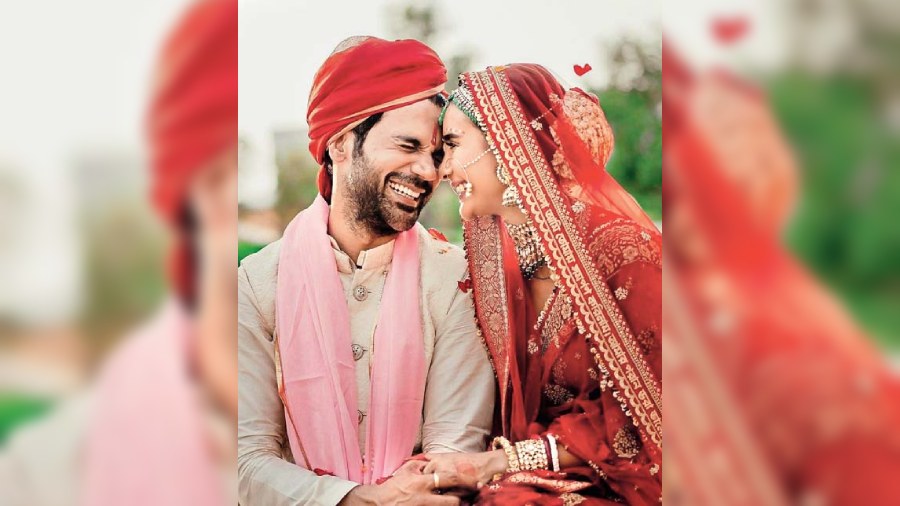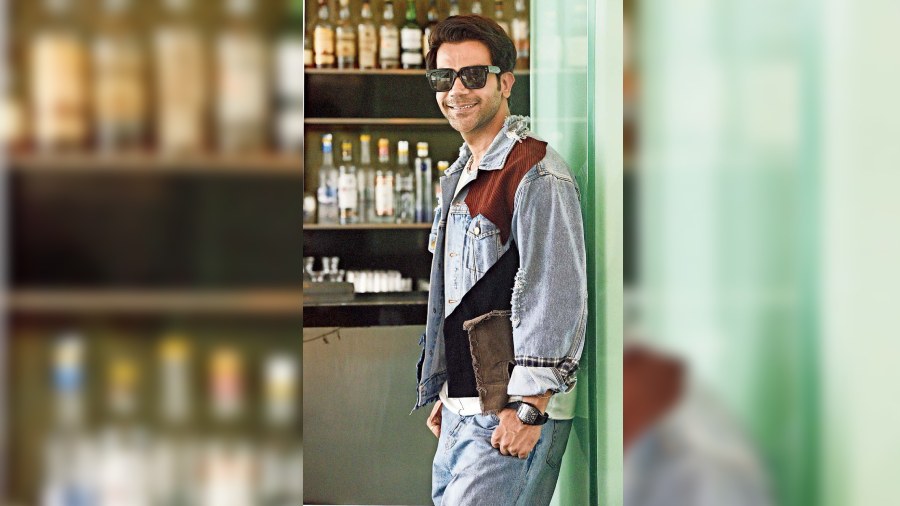The ever-chameleonic Rajkummar Rao plays a cop battling his personal demons as he investigates a murder in Hit: The First Case. A remake of the 2020 Telugu film of the same name and starring Vishwak Sen in the part played by Raj in the Hindi version, the July 15 release also stars Sanya Malhotra.
Earlier this week, Rajkummar — whose turn in the recent film Badhaai Do was massively appreciated — was in Calcutta to promote his latest film. The Telegraph chatted with the always affable actor at The Park on why he believes in playing a character and not a hero, what drives him and how marriage completes him.
The original Telugu film, Hit: The First Case, was a thriller that ticked all the right boxes, but also expanded the genre. What were your reasons to sign on, given this is your first remake?
I am not someone who is into remakes... I get offered a lot of them, but I don’t do them. This is my first remake, though City Lights was a remake of (British film) Metro Manila. So yes, this is my first remake of an Indian film. Like you, when I watched the Telugu original, I really enjoyed it. As an actor, I found that there is so much to do with the character, Vikram Jaisingh, that I play. I haven’t done something like this before.
Doing this film has given me the opportunity to work with the same director (Sailesh Kolanu) as the original. I wanted to see how he would approach this; I didn’t want to do something that was simply a copy-paste job. Sailesh is a young film-maker, a very passionate and talented young boy. First up, he told me how he wanted to make the remake as his first film and have a new take on the story. We have changed a lot of things in the script — the climax, the whole emotional arc of the character and so many other things. The shot-taking, BGM (background music), the performances... they are all different.
I watched the Telugu film long back, when we had initial discussions about the remake, but after that, I didn’t go back to it. I wanted to have my own voice and my own approach. Everything came from my own imagination and my conversations with the director.
How necessary was it for you to approach this as a new film given that now, more than ever, many in the audience have access to the original? Plus, it’s a thriller, where the cards are already out...
It is important. I am not a fan of copy-paste at all. If the same maker is directing it, then even for him the challenge would be to not only treat it differently but also make it better because we always learn from things we have done for the first time. Like if I had to do Shahid (2012) again, I would do some things differently... that’s because I have grown as a person, I have grown as an artiste. Sailesh has tried to make this one bigger and better.
Your character in this film, like it was in the original, overturns the concept of a macho cop. He’s vulnerable, he battles PTSD and he’s emotionally not often in control. What was like it for you to play a man as fallible and flawed as this?
That’s the beauty of Vikram’s character. He’s human, he’s flawed and he’s very believable. If someone is a cop, it doesn’t mean he has to be this rugged, macho guy. He can have his troubles, his personal baggage. That’s what happens with Vikram.
In this country, we don’t really talk about mental health as much as we should... I really don’t know why. I am hoping that after this film, people will start having at least some sort of conversation about mental health. That they can at least accept the fact that they are going through a rough phase and there is nothing wrong in seeking help.
Sailesh had done a lot of research before writing the film. He took three-four years to write after poring through about 300 real-life cases. Vikram suffers from PTSD and has panic attacks and I don’t have any personal experience of this. So I had to do some reading, watch a lot of reference videos; I spoke to a couple of experts in the field.... And Sailesh is a PhD himself (he was an associate professor in medicine at the University of New South Wales before he turned director). I wanted that everything that I do in this film comes from a very real space and is very organic.
This is your second theatrical release this year, unlike many of your contemporaries who have been waiting for a big-screen release for a long time because of the pandemic. How much does the positive response to Badhaai Do give you confidence for this film?
Honestly, in terms of numbers, we were expecting a lot more with Badhaai Do, but given at the time it released (February 2022), I think it did fairly well. We wish we could have released the film now because now is a better time. But I am so proud of the film. Even Patralekhaa (wife, who is also an actor) feels that this is the best so far in my career. I am so glad I got to be a part of Badhaai Do. It’s touched the lives of so many people, we get so many calls and messages even now — it’s out on Netflix — that the film gave them so much strength to come out to their families. It’s not an easy task, and if a film can do that, if it can change peoples’ lives... what more can one want?!
You have always been off-centre with your choices. You started your career with a negative role in Love Sex Aur Dhokha, played an unlikable man in Queen, dressed in drag in Ludo and the list goes on. Where does playing a homosexual man, again a cop, in Badhaai Do fit in?
I have never understood this term ‘hero’. We are actors who are supposed to play every kind of character on screen. For me, the only fun part of being an actor is pushing myself and doing different characters. I have to go out there and explore. Badhaai Do was a step towards that. I don’t believe in being alpha male... everyone is real, everyone has emotions.
Is there something you wouldn’t ever do on screen?
If I am approached for a part or a film that I know is morally questionable or can hurt someone’s sentiments or have a negative impact on society, I avoid that.
A little more than a decade in the business, what would you pick as the Top 3 highlights?
LSD is what I started with and that would definitely count. Then comes winning the National Award (for Best Actor) for Shahid. And I think Stree and Bareilly Ki Barfi changed a lot of things for me. That’s when people saw me in a new light. They were like, ‘Okay, he can do comedy as well, and also dance!’ (Laughs)

Rajkummar and Patralekhaa at their wedding in November last year
You and Patralekhaa have been one of the most steady couples in Bollywood. How has married life been like so far?
We had been dating for 11 years before marriage and now we have been married for about six-seven months. I just feel complete (smiles). She understands me like no one else.
Apart from acting, what drives you in life?
I really want to give back to society. During the pandemic, I tried what I could — in fact, many of my colleagues were doing the same — and I get very disturbed by certain things that aren’t right. So I do my bit, whether it’s charity or just helping out in whichever way I can. If I can change someone’s life, that gives me a lot of comfort.
On the lighter side, apart from acting, I love travelling. Patralekhaa and I recently went on a holiday to Italy. Whenever we get a chance, we travel. And wherever we go, we explore places on foot, we walk several kilometres a day. I love that!
And I know you stream a lot of content!
Oh yes! I watch a lot. I just finished Dopesick and on the flight coming here, I watched Vol 2 of Stranger Things...
Liked it?
Loved it! I love Eleven (smiles).
